Unit1 直接引语与间接引语
高一英语Unit 1 grammar直接引语与间接引语-人教版[整理]
![高一英语Unit 1 grammar直接引语与间接引语-人教版[整理]](https://img.taocdn.com/s3/m/8c5ea96ea45177232f60a278.png)
Conclusion
1. 当主句的谓语动词是一般现在时的时候 2. 当主句的谓语动词是将来时的时候 3. 当直接引语部分带有具体的过去时间状 语时 4. 当直接引语中有以when, while引导的从 句,表示过去的时间时 5. 当直接引语是客观真理或自然现象时 6. 当引语是谚语、格言时 7. 当直接引语中有情态动词should, would, could, had better, would rather, might, must, ought to, used to, need时
Tom
said that they were listening to the pop music. Mother asked, “Have you finished your homework before you watch TV?” Mother asked me whether I had finished my homework before I watched TV.
Our teacher said to us, “Light travels faster than sound. ” Our teacher told us that light travels faster than sound. He said,“Practice makes perfect. ” He said that practice makes perfect. He said, “She must be a teacher. ” He said that she must be a teacher. The doctor said, “You'd better drink plenty of water. ” The doctor said I'd better drink plenty of water.
(完整版)英语语法----直接引语和间接引语
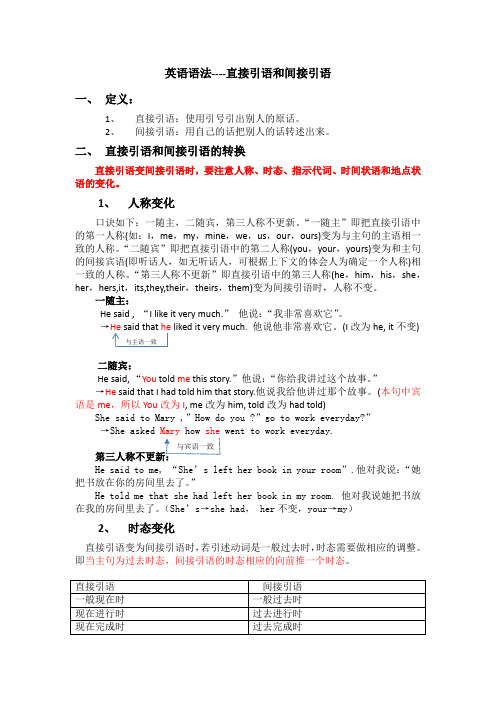
英语语法----直接引语和间接引语一、 定义:1、 直接引语:使用引号引出别人的原话。
2、间接引语:用自己的话把别人的话转述出来。
二、 直接引语和间接引语的转换直接引语变间接引语时,要注意人称、时态、指示代词、时间状语和地点状语的变化。
1、 人称变化口诀如下:一随主,二随宾,第三人称不更新。
“一随主”即把直接引语中的第一人称(如:I ,me ,my ,mine ,we ,us ,our ,ours)变为与主句的主语相一致的人称。
“二随宾”即把直接引语中的第二人称(you ,your ,yours)变为和主句的间接宾语(即听话人,如无听话人,可根据上下文的体会人为确定一个人称)相一致的人称。
“第三人称不更新”即直接引语中的第三人称(he ,him ,his ,she ,her ,hers,it ,its,they,their ,theirs ,them)变为间接引语时,人称不变。
一随主:He said , “I like it very much.” 他说:“我非常喜欢它”。
→liked it very much. 他说他非常喜欢它。
(I 改为he, it 不变)二随宾:He said, “You told me this story.”他说:“你给我讲过这个故事。
”→He said that I had told him that story.他说我给他讲过那个故事。
(本句中宾语是me ,所以You 改为I , me 改为him, told 改为had told)She said to Mary ,”How do you ?”go to work everyday?” →She asked Mary how she went to work everyday. 第三人称不更新:He said to me, “She’s left her book in your room ”.他对我说:“她把书放在你的房间里去了。
人教版高中英语必修1至选修10各个单元语法一览表
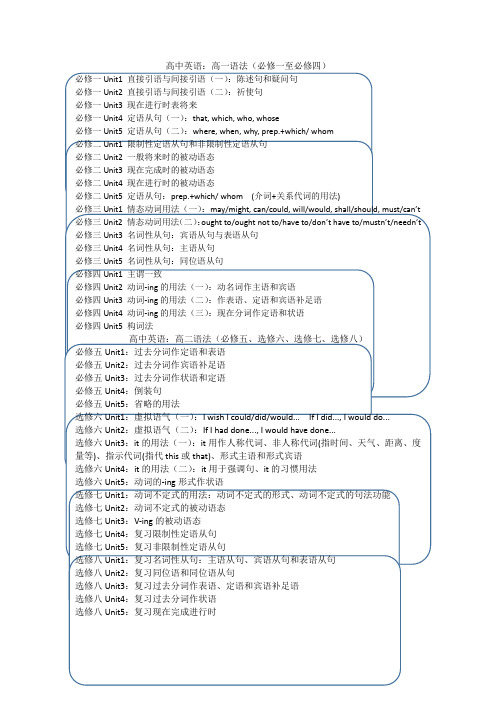
必修二Unit2一般将来时的被动语态
必修二Unit3现在完成时的被动语态
必修二Unit4现在进行时的被动语态
必修二Unit5定语从句:prep.+which/ whom (介词+关系代词的用法)
必修三Unit1情态动词用法(一):may/might, can/could, will/would, shall/should, must/can’t
必修三Unit2情态动词用法(二):ought to/ought not to/have to/don’t have to/mustn’t/needn’t
必修三Unit3名词性从句:宾语从句与表语从句
必修三Unit4名词性从句:主语从句
必修三Unit5名词性从句:同位语从句
必修四Unit1主谓一致
必修四Unit2动词-ing的用法(一):动名词作主语和宾语
选修六Unit3:it的用法(一):it用作人称代词、非人称代词(指时间、天气、距离、度量等)、指示代词(指代this或that)、形式主语和形式宾语
选修六Unit4:it的用法(二):it用于强调句、it的习惯用法
选修六Unit5:动词的-ing形式作状语
选修七Unit1:动词不定式的用法:动词不定式的形式、动词不定式的句法功能
必修四Unit3动词-ing的用法(二):作表语、定语和宾语补足语
必修四Unit4动词-ing的用法(三):现在分词作定语和状语
必修四Unit5构词法
高中英语:高二语法(必修五、选修六、选修七、选修八)
必修五Unit1:过去分词作定语和表语
必修五Unit2:过去分词作宾语补足语
必修五Unit3:过去分词作状语和定语
高一英语必修一Unit1Grammar语法直接引语间接引语
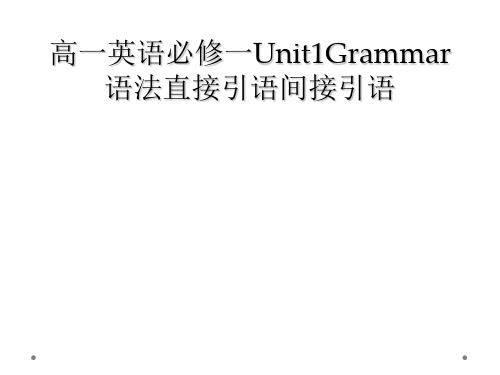
仍用一般现在时。例如: Teacher said to us:" The moon moves round
the earth." Teacher told us the moon moves round the earth. The teacher said to us : “Light travels faster
宾语从句
判断以下哪些句子属于间接引语
She said that she didn’t want to be a teacher. 间接 She said, “I don’t want to be a teacher〞.直接 He said, “ I like playing football〞. 直接 He said that he liked playing football. 间接
3. Mr Black said, “I have walked a long way this week.〞 Mr Black said that __ a long way __. A. I had walked…last week B. he had walked…that week C. I walked…last week D. he has walked…this week
〞 • 间接引语 Mum told me that I could clean my bedroom the next day . • Mr. Smith said,“He is a good worker. ’’ • Mr. Smith said that he was a good worker.
3.人称的变化
• 直接引语里的第一人称和第二人称,变间接引语时,人称要做相 应调整。例如:
人教版高一英语--直接引语与间接引语的转换
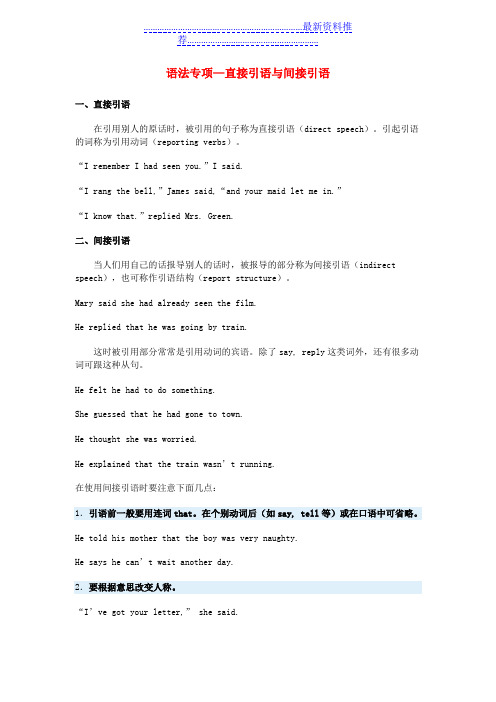
语法专项—直接引语与间接引语一、直接引语在引用别人的原话时,被引用的句子称为直接引语(direct speech)。
引起引语的词称为引用动词(reporting verbs)。
“I remember I had seen you.”I said.“I rang the bell,”James said,“and your maid let me in.”“I know that.”replied Mrs. Green.二、间接引语当人们用自己的话报导别人的话时,被报导的部分称为间接引语(indirect speech),也可称作引语结构(report structure)。
Mary said she had already seen the film.He replied that he was going by train.这时被引用部分常常是引用动词的宾语。
除了say, reply这类词外,还有很多动词可跟这种从句。
He felt he had to do something.She guessed that he had gone to town.He thought she was worried.He explained that the train wasn’t running.在使用间接引语时要注意下面几点:1.引语前一般要用连词that。
在个别动词后(如say, tell等)或在口语中可省略。
He told his mother that the boy was very naughty.He says he can’t wait another day.2.要根据意思改变人称。
“I’ve got your letter,” she said.→She said to him, “Your pronunciation is better than mine.”→3.引语中的谓语要和句子主要谓语在时态上一致。
必修一Unit1语法直接引语间接引语及练习

直接引语和间接引语引述某人的话一般采用两种形式:一种是直接引语(Direct Speech),即原封不动地引用原话,把它放在引号内;另一种是间接引语(Indirect Speech),即用自己的话加以转述,被转述的内容不放在引号内。
一、直接引语变间接引语A.陈述句的间接引语直接引语是陈述句,变为间接引语时,在多数情况下都构成一个that引导的宾语从句,引述动词通常是say, tell等。
与此同时,间接引语中的人称、时态和其他方面也要相应有所变化。
The foreigner aid to me, I like Beijing very much.那老外告诉我:我很喜欢北京。
→The foreigner told me that he she liked Beijing very much. 那老外告诉我说他(她)很喜欢北京。
She said,We are very fond of sports. 她说:我们都喜欢体育运动。
→She said that they were very fond of sports. 她说他(她)们都喜欢体运动。
I'll go over the grammar lesson once again,he said. 他说:我将把语法课再复习一遍→He said he would go over the grammar lesson once again. 他说他将要把语法课再复习一遍。
B.疑问句的间接引语1.一般疑问句和反意疑问句一般疑问句改为间接引语时,要用陈述语序,并要加连词if 或whether,其主句动词常用ask, wonder, wantto know, didn't know等。
句末不用问号。
My teacher asked me, Do you like American country music 我老师问我:你喜欢美国乡村音乐吗?→My teacher asked me ifwhether I liked American country music. 我老师问我是否喜欢美国乡村音乐。
高中英语必修1:Unit 1 直接引语和间接引语

Unit one FriendshipDirect speech and indirect speech(直接引语和间接引语)一.基本概念I直接引语变为间接引语1)、直接引语为陈述句2)、直接引语为祈使句3)、直接引语为疑问句4)、直接引语为感叹句II1、直接引语和间接引语都属于宾语从句2、直接引语和间接引语的概念(1)直接引语:一字不改地引述别人的话(2)间接引语:用说话人自己的话转述别人的话二.变换类型1.直接引语为陈述句直接引语为陈述句,用that引导(口语中可以省略)。
引述动词有:say, tell等。
陈述句变间接引语要注意:1、人称的变化2、指示代词、时间状语、地点状语和动词的变化3、时态的变化4、人称的变化。
一般的规则:一随主,二随宾,三不变例如:The teacher said, “John, you must bring your book to the class. ”1> 第三者说:The teacher told John that he must bring his book to the class.2> 别人对约翰说:The teacher said that you must bring your book to the class.3> 约翰自己说:The teacher said that I must bring my book to the class.I指示代词、时间状语、地点状语和动词的变化1〉指示代词的变化this---- that these----those2〉时间状语的变化now---- then ago---- before today----that day yesterday----the day before; theprevious day tomorrow----the next day; the following day the day beforeyesterday----two days before the day after tomorrow----two days later nextweek/month, etc.----the next week/month, etc. last week/month, etc.----theweek/month before3〉地点状语的变化here----there4〉动词的变化come----go注:在当地转述时,here不变为there,come不变为go.在当天转述时,yesterday, tomorrow等时间状语也不变。
必修一unit1直接引语和间接引语
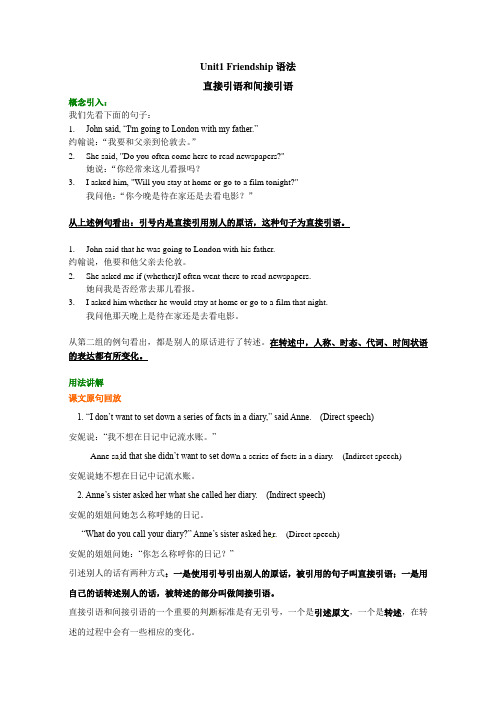
Unit1 Friendship语法直接引语和间接引语概念引入:我们先看下面的句子:1.John said, “I'm going to London with my father.”约翰说:“我要和父亲到伦敦去。
”2.She said, "Do you often come here to read newspapers?"她说:“你经常来这儿看报吗?3.I asked him, "Will you stay at home or go to a film tonight?"我问他:“你今晚是待在家还是去看电影?”从上述例句看出:引号内是直接引用别人的原话,这种句子为直接引语。
1.John said that he was going to London with his father.约翰说,他要和他父亲去伦敦。
2.She asked me if (whether)I often went there to read newspapers.她问我是否经常去那儿看报。
3.I asked him whether he would stay at home or go to a film that night.我问他那天晚上是待在家还是去看电影。
从第二组的例句看出,都是别人的原话进行了转述。
在转述中,人称、时态、代词、时间状语的表达都有所变化。
用法讲解课文原句回放1. “I don’t want to set down a series of facts in a diary,” said Anne. (Direct speech)安妮说:“我不想在日记中记流水账。
”Anne sa id that she didn’t want to set dow n a series of facts in a diary. (Indirect speech)安妮说她不想在日记中记流水账。
Unit 1 Grammar直接引语变间接引语

What did Mary say?
Mary
Mary said :“I am late.” 直接引语
Mary said she was late. 间接引语
Grammar
Direct and Indirect Speech
直接引语和间接引语
Direct and Indirect Speech
ห้องสมุดไป่ตู้
He said he was going to do his homework.
What did he say?
“I am going to do my homework.”
人 称 时 态
He said
he was going to do his homework.
“一随主”
1 She said, “I am hungry.” She said (that) she was hungry. 2 He said , “ I am a solider.” He said (that) he was a solider
3 She said, “I am swimming” She said (that) she was swimming.
“二随宾” He said to Kate, “Your sister looks friendly.” He told Kate her sister looked friendly.
Practices:
1.Tom said, “ I am a teacher”.
2. Mary said, “I am having breakfast.” 3.The little girl said, “ I can sing a lot of English songs.”
高一英语UNit1直接引语和间接引语课件人教课标必修1

Goodbye!
9、静夜四无邻,荒居旧业贫。。*** 10、雨中黄叶树,灯下白头人。。**** 11、以我独沈久,愧君相见频。。***** 12、故人江海别,几度隔山川。。**** 13、乍见翻疑梦,相悲各问年。。***** 14、他乡生白发,旧国见青山。。**** 15、比不了得就不比,得不到的就不要。。。***** 16、行动出成果,工作出财富。。*** 17、做前,能够环视四周;做时,你只能或者最好沿着以脚为起点的射线向前。。**** 9、没有失败,只有暂时停止成功!。*** 10、很多事情努力了未必有结果,但是不努力却什么改变也没有。。**** 11、成功就是日复一日那一点点小小努力的积累。。***** 12、世间成事,不求其绝对圆满,留一份不足,可得无限完美。。**** 13、不知香积寺,数里入云峰。。***** 14、意志坚强的人能把世界放在手中像泥块一样任意揉捏。**** 15、楚塞三湘接,荆门九派通。。。***** 16、少年十五二十时,步行夺得胡马骑。。*** 17、空山新雨后,天气晚来秋。。**** 9、杨柳散和风,青山澹吾虑。。*** 10、阅读一切好书如同和过去最杰出的人谈话。**** 11、越是没有本领的就越加自命不凡。***** 12、越是无能的人,越喜欢挑剔别人的错儿。**** 13、知人者智,自知者明。胜人者有力,自胜者强。***** 14、意志坚强的人能把世界放在手中像泥块一样任意揉捏。**** 15、最具挑战性的挑战莫过于提升自我。。***** 16、业余生活要有意义,不要越轨。*** 17、一个人即使已登上顶峰,也仍要自强不息。****
Unit1语法(直接引语和间接引语)

】
When seeing the stone, the car stopped.【误】
必修1
【链接训练】 ________, the disease diphtheria(白喉) will produce a
powder poison that will kill the patient.
A.If it untreated C.If being untreated 【解析】 B.If is untreated D.If untreated
必修1
Young as I am,I already know what career I want to follow.(引导让步状语从句) 尽 管 很年轻 ,我已经知道我要追求什么样的事业 。 Why didn't you catch the last bus as I told you to?(引导方式 状语从句) 你为什么没照我说的那样赶上最后一班公交车? As you weren't there,I left a message.(引导原因状语从 句)你不在那儿,所以我留了个口信。
必修1
(2)“介词with+宾语+宾语补足语”构成的复合结构 在句子中通常作状语,表示时间、伴随、行为方式、原因或 条件等,另外,该结构也可以作后置定语。 She ran and ran with beads of sweat running down her face.她不停地跑,汗珠顺着脸流了下来。
一、把直接引语变为间接引语时需要注意以下变化:
1.主句谓语动词的变化 (1)直接引语是陈述句,变为间接引语时,主句的谓语 动词部分said to sb.要变为told sb.。 (2)直接引语是一般疑问句或特殊疑问句,变为间接引 语时,主句的谓语动词said要变为asked。
高一英语人教课标必修1unit1语法——直接引语和间接引语素材

4. The man thought, “I shall take it back tomorrow.” The man thought that __ take it back ____. A. I shall…tomorrow B. I shall…the next day C. he should…tomorrow D. he would …the next day
She said that she hadn’t seen her that day.
④直接引语如果是祈使句,间接引语应改为“ Tell (ask, order, beg等) sb (not) to do sth.”句型 。 如:
1."Don't make any noise," the teacher said to the students. →She told (ordered) the students not to make any noi se. 2.“Open the door, please," said she. →She asked him to open the door.
⑤直接引语如果是以“Let's”开头的祈使句,变为间 接引语时,通常用“suggest +动名词(或从句)” 如: He said, "Let's go to the movies."
→He suggested going to the movies. 或He suggested that they should go to see the movies.
3. 直接引语是特殊疑问句,变为间接引语 引导词为: 特殊疑问词 语序: 陈述(即主语在前,谓语在后)
2019-2020英语必修四讲义:Unit 1 Section Ⅲ Grammar——直接引语和间接引语 含答案
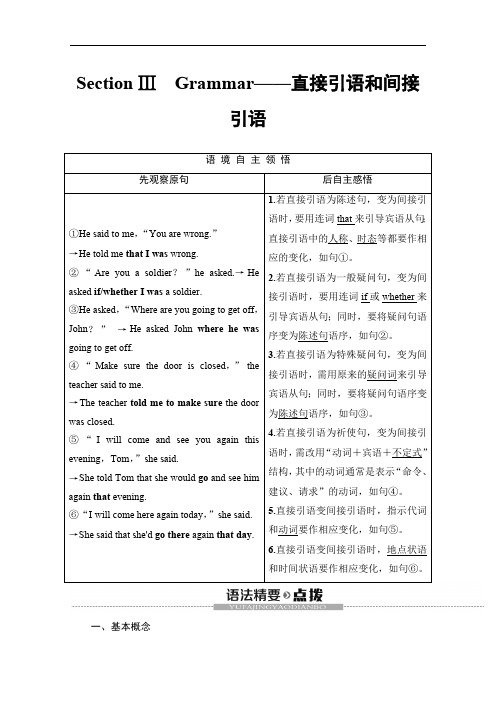
Section Ⅲ Grammar——直接引语和间接引语语境 自 主 领 悟先观察原句后自主感悟①He said to me ,“You are wrong.”→He told me that I was wrong.②“Are you a soldier ?”he asked.→He asked if/whether I was a soldier.③He asked ,“Where are you going to get off ,John ?” →He asked John where he was going to get off.④“Make sure the door is closed ,”the teacher said to me.→The teacher told me to make sure the doorwas closed.⑤“I will come and see you again thisevening ,Tom ,”she said.→She told Tom that she would go and see himagain that evening.⑥“I will come here again today ,”she said.→She said that she'd go there again that day . 1.若直接引语为陈述句,变为间接引语时,要用连词that 来引导宾语从句;直接引语中的人称、时态等都要作相应的变化,如句①。
2.若直接引语为一般疑问句,变为间接引语时,要用连词if 或whether 来引导宾语从句;同时,要将疑问句语序变为陈述句语序,如句②。
3.若直接引语为特殊疑问句,变为间接引语时,需用原来的疑问词来引导宾语从句;同时,要将疑问句语序变为陈述句语序,如句③。
4.若直接引语为祈使句,变为间接引语时,需改用“动词+宾语+不定式”结构,其中的动词通常是表示“命令、建议、请求”的动词,如句④。
高中英语unit1直接引语和间接引语教案
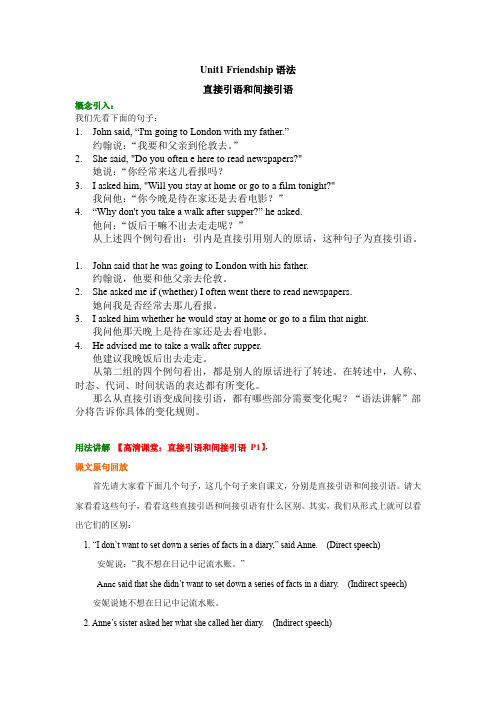
Unit1 Friendship语法直接引语和间接引语概念引入:我们先看下面的句子:1.John said, “I'm going to London with my father.”约翰说:“我要和父亲到伦敦去。
”2.She said, "Do you often e here to read newspapers?"她说:“你经常来这儿看报吗?3.I asked him, "Will you stay at home or go to a film tonight?"我问他:“你今晚是待在家还是去看电影?”4.“Why don't you take a walk after supper?” he asked.他问:“饭后干嘛不出去走走呢?”从上述四个例句看出:引内是直接引用别人的原话,这种句子为直接引语。
1.John said that he was going to London with his father.约翰说,他要和他父亲去伦敦。
2.She asked me if (whether) I often went there to read newspapers.她问我是否经常去那儿看报。
3.I asked him whether he would stay at home or go to a film that night.我问他那天晚上是待在家还是去看电影。
4.He advised me to take a walk after supper.他建议我晚饭后出去走走。
从第二组的四个例句看出,都是别人的原话进行了转述。
在转述中,人称、时态、代词、时间状语的表达都有所变化。
那么从直接引语变成间接引语,都有哪些部分需要变化呢?“语法讲解”部分将告诉你具体的变化规则。
用法讲解【高清课堂:直接引语和间接引语P1】,课文原句回放首先请大家看下面几个句子,这几个句子来自课文,分别是直接引语和间接引语。
Unit1 Section Ⅲ Grammar——直接引语和间接引语(Ⅰ)

(3)在句 10 中,直接引语中的 here 和 the day before yesterday 在间 接引语中分别变为 there 和 two days before ;同时在主句和从句之 间加入了连接词 that。 (4)直接引语是一般疑问句或反意疑问句,变为间接引语时,常将 它变成由 if 或 whether 导的宾语从句,其主句动词常用 ask 。如 句 2、6、11。 (5)直接引语为特殊疑问句,变为间接引语时,将它变成由原来的 疑问词 引导的宾语从句。如句 7、12。 (6)语序变化:直接引语如果是疑问句,变为间接引语时,要把疑 问句语序变为 陈述句语序 。如句 2、3、4、6、7、11、12。
一、人称的变化 直接引语变为间接引语时,人称代词要根据转述人立场的变 化作相应的改变。 [助记] 直接引语变间接引语人称变化口诀:
“一随主,二随宾,第三人称不更新。”
1.“一随主”。 指在直接引语变间接引语时,直接引语 中出现的第一人称的代词要按照引述动词的主语的人称变化。
John said,“I want to visit the World Expo.” →John said that he wanted to visit the World Expo. She said,“My brother wants to go with me.” →She said her brother wanted to go with her.
•9、要学生做的事,教职员躬亲共做;要学生学的知识,教职员躬亲共学;要学生守的规则,教职员躬亲共守。2021/8/312021/8/31Tuesday, August 31, 2021 •10、阅读一切好书如同和过去最杰出的人谈话。2021/8/312021/8/312021/8/318/31/2021 1:03:45 AM •11、只有让学生不把全部时间都用在学习上,而留下许多自由支配的时间,他才能顺利地学习……(这)是教育过程的逻辑。2021/8/312021/8/312021/8/31Aug-2131-Aug-21 •12、要记住,你不仅是教课的教师,也是学生的教育者,生活的导师和道德的引路人。2021/8/312021/8/312021/8/31Tuesday, August 31, 2021
- 1、下载文档前请自行甄别文档内容的完整性,平台不提供额外的编辑、内容补充、找答案等附加服务。
- 2、"仅部分预览"的文档,不可在线预览部分如存在完整性等问题,可反馈申请退款(可完整预览的文档不适用该条件!)。
- 3、如文档侵犯您的权益,请联系客服反馈,我们会尽快为您处理(人工客服工作时间:9:00-18:30)。
直接引语和间接引语
⏹定义:引用别人的话有两种方式,一种是直接引用别人原句,这
叫直接引语;另一种是用自己的话来转述别人话,且不能用引号,这是间接引语。
⏹直接引语变间接引语的注意事项:
●人称的变化:一随主,二随宾,第三人称不更新
●时态的变化:直接引语时态+did变间接引语时态,完成时除
外。
谓语动词时态变化需要注意以下几点:
1)直接引语表述的是客观真理或谚语格言,变为间接引语时,时态
不变。
eg:The geography teacher said to me, “ The earth is round.”
The geography teacher told me that the earth is round.
2)主语谓语动词的时态是现在时态,变为间接引语时,时态不变。
eg: She says, “ I will save the world.”
She says that she’ll save the world.
3)直接引语部分带有具体的表示过去时间的状语,变为间接引语
时,时态不变。
eg: He said,” I was born in 2000 in Zhengzhou.”
He said that he was born in 2000 in Zhengzhou.
指示代词,时间状语,地点状语及方向性动词的变化
句子结构的变化
1)陈述句
间接引语用连接词that引导,that在口语中常省略。
主句的谓语动词可直接用原主句中的谓语动词said,也可用told来代替。
【注意:可以用said that, said to sb that, told sb that, 但不可用told that.】
He said,” I have been to the Great Wall.”
He said to us that he had been to the Great Wall.
2)一般疑问句或反义疑问句
间接引语用whether或if引导,原主句中谓语动词said要改为asked
(me/him/us等),语序是陈述语序。
He said,” Do you like English?”
He asked (me) if/whether I liked English.
H e said,” You are interested in English, aren’t you?”
He asked (us) if/whether we were interested in English.
3)特殊疑问句
原句中的疑问词作为间接引语的连接词,间接引语主句的谓语动词用ask(sb)来表达,语序改为陈述语序。
He said to me,” What’s your name?”
He asked me what my name was.
4)选择疑问句
用whether…or…句式,而不用if…or…或either…or…
He asked,” Do you speak English or French?”
He asked me whether I spoke English or French.
5)祈使句
直接引语的结构是:主语+动词+祈使句。
间接引语的结构是:主语+动词+to do
【祈使句变间接引语时,主要使用动词不定式,且谓语动词要做一定变化。
表示命令时,用order,command等;表示请求时,用ask, beg, request等;表示忠告时,一般用advice。
】
H e said to me,” Come in.”
He told me to come in.。
